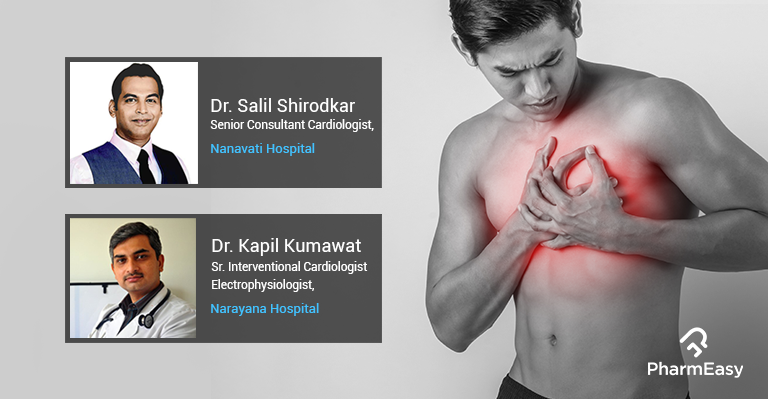Difference Between Heart Attack and Cardiac Arrest!
By Dhwani Jerajani +2 more

Get more insightful and
helpful tips to
treat Diabetes for FREE



Download PharmEasy App




Register to Avail the Offer
Send OTPBy continuing, you agree with our Privacy Policy and Terms and Conditions
By Dhwani Jerajani +2 more
Heart attack and cardiac arrest are two of the most common heart conditions that lead to death in most cases. We often confuse the two terms and even use them interchangeably at times. These two conditions are very different and to understand their differences, we spoke to Senior Consultant Cardiologist, Dr Salil Shirodkar at Nanavati Hospital, Mumbai and Senior Interventional Cardiologist & Electrophysiologist at Narayana Hospital, Dr Kapil Kumawat.

The primary difference between a heart attack and a cardiac arrest, the causes for each of the conditions and how a heart attack can be prevented are explained concisely by the cardiologists.
Table of Contents
The heart is supplied by two coronary arteries – left coronary artery and the right coronary artery and their branches. A blockage in one of these branches leads to stoppage of blood flow to the heart muscle. This leads to a heart attack.
A cardiac arrest occurs when the heart stops beating suddenly. If a person develops cardiac arrest, they will lose consciousness and collapse. One of the major causes of cardiac arrest is a heart attack.
When the blockage occurs in the widowmaker artery, a large area of the heart muscle doesn’t receive adequate blood supply. This leads to a cardiac arrest.
Another critical reason for cardiac arrest is the degeneration of the electric cell. Heartbeats are generated by this electric cell and degeneration in one of those cells stops the heart impulses entirely.
The most common reasons that lead to a heart attack are:
1) Smoking
2) Alcohol
3) Old Age
4) Unhealthy food habits
5) Genetic Predisposition
6) Lack of exercise
7) Obesity
Multiple causes can lead to a cardiac arrest. These are:
1) Degeneration of the electric cells
2) Heart Attack
3) Heart muscle problems such as cardiomyopathy
4) Electrolyte abnormalities – A sudden increase or decrease in the potassium level in the body
5) A sudden blow to the chest
6) Very slow rhythm or a sudden fast rhythm
7) Genetic Predisposition
Yes, a heart attack can be prevented by maintaining a healthy lifestyle. Dr. Shirodkar recommends following a healthy diet, exercising on a regular basis, reducing stress and keeping drinking and smoking to a minimum for the good health of your lungs and heart. Poor health of lungs inversely affects your heart health too.
Patients who suffer from diabetes and cholesterol should keep those two factors in check as well.
Although a cardiac arrest cannot be prevented as it can occur due to multiple factors, Dr Kumawat suggests that each patient is different and they require an individual evaluation to find out if they are at risk of having a cardiac arrest.
Patients with prior heart problems should consult with their treating doctor and understand if they require an ICD (Implantable Cardioverter Defibrillator). This is also applicable to patients who have undergone a successful surgery or angioplasty.
It is clear that in an emergency situation, a specific medication won’t be of any help because cardiac arrest is a condition wherein the heart stops beating all of a sudden. Yet, Dr. Kumawat urges patients to carry their routine cardiac medications while traveling and in similar situations.
As a form of first aid, if a person is having a cardiac arrest, bystanders can quickly provide BCLS (Basic Cardiac Life Support) that includes a cardiac massage and defibrillation using an AED (Automated Cardioverter Defibrillator). An AED is easily available in public places such as airports, aircraft, malls, etc. For this reason, everyone should learn how to give BCLS and use an AED. Be aware of the general symptoms of a poor heart so that you can be well prepared if any misfortune happens in the future. Also remember these symptoms differs from men to women, hence get your research done for both.
Also Read: First Aid Treatment for Heart Attack
Now that we know the primary differences between a heart attack and a cardiac arrest, we can use these terms undoubtedly. It is important to enjoy life, have new experiences and make unforgettable memories, but at the same time, ensure that you take care of your heart and follow tips for a healthy heart. This will surely prevent undesirable heart conditions for long life.
Disclaimer: The information provided here is for educational/awareness purposes only and is not intended to be a substitute for medical treatment by a healthcare professional and should not be relied upon to diagnose or treat any medical condition. The reader should consult a registered medical practitioner to determine the appropriateness of the information and before consuming any medication. PharmEasy does not provide any guarantee or warranty (express or implied) regarding the accuracy, adequacy, completeness, legality, reliability or usefulness of the information; and disclaims any liability arising thereof.
Links and product recommendations in the information provided here are advertisements of third-party products available on the website. PharmEasy does not make any representation on the accuracy or suitability of such products/services. Advertisements do not influence the editorial decisions or content. The information in this blog is subject to change without notice. The authors and administrators reserve the right to modify, add, or remove content without notification. It is your responsibility to review this disclaimer regularly for any changes.
Comments